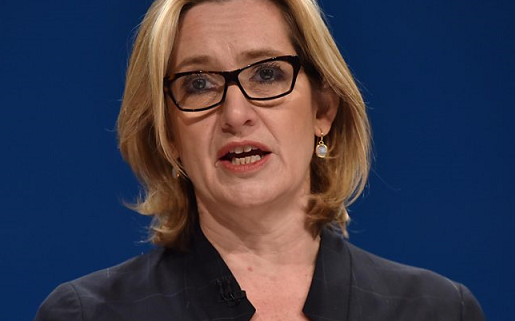
The home secretary Amber Rudd has resigned, saying she “inadvertently misled” MPs over targets for removing illegal immigrants.
Ms Rudd, who had been due to make a Commons statement, was under pressure to quit over the Windrush scandal.
She faced criticism over the existence of Home Office removals targets and her knowledge of them.
Shadow home secretary Diane Abbott, who had repeatedly urged Ms Rudd to go, said she had “done the right thing”.
Ms Abbott added that the “architect of this crisis” – Theresa May – must come before the Commons to explain “whether she knew that Amber Rudd was misleading Parliament and the public last week”.
On Sunday, the Guardian published the full letter it had reported on a week earlier, in which Ms Rudd set out her “ambitious but deliverable” aim to deport 10% more illegal immigrants over the “next few years” to Theresa May.
Ms Rudd telephoned the prime minister on Sunday evening to tell her of the decision amid intensifying opposition demands for her to quit.
In her resignation letter, Ms Rudd said she takes “full responsibility” for the fact she was not aware of “information provided to (her) office which makes mention of targets”.
Mrs May said she was “very sorry” to see Ms Rudd leave the Home Office and she should “take great pride” in what she has achieved.
Ms Rudd’s successor is expected to be announced early on Monday morning.
She is the fifth person to resign from the Cabinet since last year’s general election – following Sir Michael Fallon, Priti Patel, Damian Green and James Brokenshire.
The Windrush row began when it emerged that some migrants from Commonwealth countries, who settled in the UK from the late 1940s to the 1970s, and their relatives, had been declared illegal immigrants.
Reacting to the resignation, Labour MP David Lammy said: “Amber Rudd resigned because she didn’t know what was going on in her own department and she had clearly lost the confidence of her own civil servants.
“The real issue is the hostile environment policy that caused this crisis in the first place.
“That policy must now be reviewed, and the Home Office must move quickly to compensate and grant citizenship to the Windush generation.”
Conservative MPs have been paying tribute to their colleague. Leader of the House Andrea Leadsom called her “honest and principled” while Communities Secretary Sajid Javid said she was a “huge talent” who would “no doubt be back in Cabinet soon”.
Foreign Secretary Boris Johnson said she had done “a great job during last year’s terrorist attacks and cares deeply about the people she serves”.
‘Human shield’
Former chancellor George Osborne sad it was “so sad”, adding “the government just got a bit less human”.
Meanwhile, Lib Dem leader Vince Cable told the BBC: “She’s clearly jumped before she was pushed.”
Co-leader of the Green Party Caroline Lucas said Mrs May had “lost her human shield and now looks very exposed”.
And UKIP’s former leader Nigel Farage tweeted: “Now that Amber Rudd has resigned we need a Home Secretary that supports Brexit.”
Giving evidence to the Home Affairs Select Committee last week, Ms Rudd, who has been in the post since July 2016, said there were no removals targets for illegal immigrants.
She later admitted “local” targets for voluntary removals had been set, but told the Commons on Thursday she had not been aware of them.
But the Guardian reported a June 2017 memo from an official, copied to Ms Rudd, that refers to targets.
The newspaper also published a letter, from January 2017, where Ms Rudd tells Theresa May about plans to restructure her department and increase removals “over the next few years”.
Ms Rudd’s aim of increasing “enforced deportations” would not have affected Windrush migrants, as they were threatened with “voluntary departure”.
The term “voluntary” describes the method of departure rather than the choice of whether or not to depart – those leaving in this way are able to approach the Home Office for financial assistance with travel costs.
How the ‘targets’ row unfolded:
- On Wednesday Ms Rudd told MPs investigating Windrush that there were no removals targets
- But an inspection report from December 2015 showed targets for voluntary removals did exist
- Ms Rudd then admitted “local” targets for voluntary removals had been set
- She told the Commons on Thursday she had not been aware of them
- The Guardian then reported a June 2017 memo from an official, copied to Ms Rudd, that refers to targets
- Ms Rudd said she had not seen this memo
- On Sunday evening, the Guardian published the full letter from Ms Rudd to Theresa May – which it had reported on a week earlier – setting out Ms Rudd’s aims to increase enforced deportations
Job made ‘doubly difficult’
Analysis by BBC home affairs correspondent Danny Shaw
With responsibility for immigration, counter-terrorism and policing, the job of home secretary is one of the toughest in government. During one period under Labour, there were six home secretaries in eight years.
But Amber Rudd’s job was made doubly difficult because she was following Theresa May, who’d survived in the post for more than six years and had set in train a series of plans and objectives that Ms Rudd was expected to stick to, even if she disagreed with them.
The former energy secretary was unable to put her stamp on any significant policy during her 21 months at the Home Office; much of her time was spent fire-fighting – dealing with the implications of Brexit, the rise in violent crime and last year’s terror attacks.
Presentationally, Amber Rudd was impressive. But she lacked a command of the detail, which her predecessor had mastered, and it proved to be her undoing.
Analysis
By BBC political editor Laura Kuenssberg
An inevitable resignation? Certainly there has been a mismatch between what she told MPs last week and the evidence that emerged.
In a different time, and with a minister with enemies, she’d likely have been out on Friday.
This time the Tory party was fighting hard to keep her. But beyond the mess-ups, perhaps part of the issue was also that she was not necessarily in tune with her predecessor’s attitude on immigration – the Home Office’s most politically charged brief.
Source: bbc.co.uk






Be the first to comment